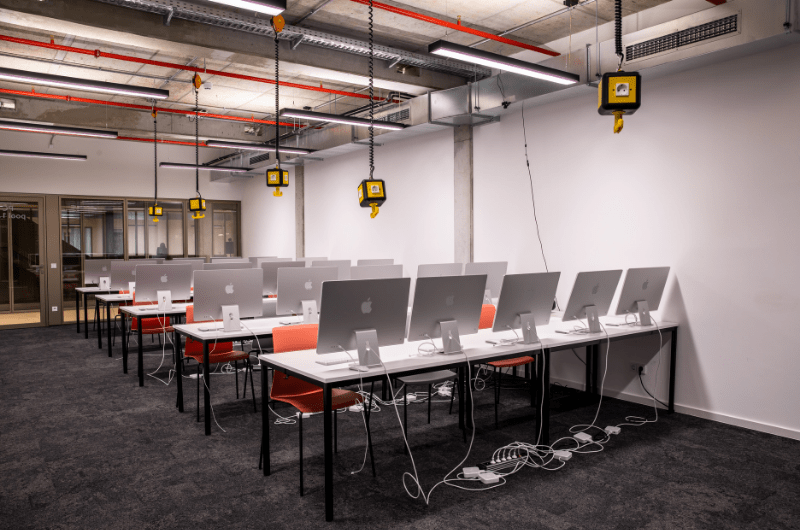
How are hospitality companies transforming their business models using AI
Artificial intelligence (AI) has been a massive technological evolution in the last few years. Scores of hospitality businesses are adopting AI-enabled tools and technologies to improve their operational efficiency or create new sources of revenue.
This trend shows no sign of stopping in 2022 and there are ample reports to prove it.
Know more about our programmeKnow more about our programme

Globalnewswire.com published a market report in 2021 that predicted the market for AI technologies in the hospitality domain will grow at 10% each year until 2026.
The future of AI in hospitality is quite bright according to many sources. An article published in Hotel Technology News went as far as to say that using AI is imperative for hotels to stay in business rather than gaining a competitive advantage.
In this scenario, it makes sense to understand more about artificial intelligence in the hospitality industry globally. This blog dives deep into both aspects and explores some of the most popular hospitality-based AI applications in use today.
What exactly is artificial intelligence?
Artificial intelligence branched off as a stream of computer science that looked into building smart machines which could emulate human intelligence. AI-based research has allowed us to build computers to carry out tasks that were initially considered cognitively difficult for machines.
Why is AI becoming more relevant by the day for the hospitality industry?
AI-powered machines can easily carry out conventional human functions without human errors at greater efficiency. This can potentially save thousands of euros for hospitality businesses as well as help them deliver immaculate customer satisfaction.
Good customer service is crucial for businesses in the hospitality industry and is often the difference between successful companies and failed ventures. AI-powered hospitality applications have allowed businesses to significantly improve their customer service through different possibilities like personalised services and recommendations.
Therefore, more and more hospitality companies are looking to adopt AI-based tools and applications to transform and improve their operations.
What are the most common AI applications in the hospitality and tourism industry today?
Much to our dissatisfaction, the use of AI in the hospitality industry is still in its infancy and might take considerable time to resemble a science-fiction film. Nevertheless, you can still find a lot of practical applications in circulation today like the ones mentioned below.
- AI is enabling in-person customer services at hotels
In-person customer services are very important in the hospitality business and often determine customer satisfaction levels. Many hospitality establishments are now outsourcing this job to AI robots.
The best example of this is Connie, an AI robot working for Hilton Hotels. Connie provides accurate tourist information to the hotel guests and answers their queries. Impressively enough, Connie is also designed to learn from these human interactions and adapt to customers better in the future.
- Customer care executives are able to reduce turn-around times for requests and messages
If there was anything that customers resented in the hospitality industry, it would have been the long turn-around time for responses in chats and direct messaging apps. Fortunately, this issue is in the past, thanks to the use of AI-powered chatbots.
Travel agencies and other hospitality companies now use AI chatbots to give instantaneous responses to customer queries and concerns at any hour of the day. This has allowed them to improve their customer ratings and reduce their dependence on human interactions.
- AI concierges are the next big innovation
Concierges are often important fixtures in big hotels that recommend different tourist sights to their guests, answer their queries and book dinner reservations in exclusive restaurants. Concierges are expected to be polite, informative and resourceful at all times.
This is why many hotels are adopting AI concierges to fulfil all these responsibilities. Guests can be assured of a consistent service 24/7 and accurate travel or tourist information. Hotels like the Radisson Blu Edwardian in London also allow their guests to text the concierge directly from their phones to free up time at the front desk.
Here are some other common examples of artificial intelligence benefits in the hospitality industry.
- Hotels are able to make more revenue through AI-enabled hyperdynamic pricing
- Sustainability is an actuality thanks to the prediction of utility usage in hotels
- AI-enabled group booking software benefits travel agencies
- AI has brought in chatbot translators to facilitate international guests
- Hotel check-ins are a breeze to navigate with AI-powered robots.
Why should you know about AI applications in the hotel industry?
With digital transformations becoming the norm everywhere, data science and AI-powered business applications are the future of every industry, including hospitality. Therefore, a minimum level of expertise in digital technologies would be expected from you if you want to establish a successful career in the hotel and tourism industry.
The best way to gain this expertise is to pursue a relevant course in data science and digital business. A good MSc artificial intelligence degree can give you a competitive advantage for any role in a future or tech-oriented company.
GISMA Business School in Potsdam near Berlin offers a BSc Data Science, AI, and Digital Business programme that ticks all the boxes. You can select a postgraduate degree in the same field from GISMA if you already have a bachelor’s degree.
Both courses offer a unique combination of technology and business perspectives that can help you understand and implement data science and AI applications in your company.
The course curriculum of the masters in artificial intelligence allows you to explore other digital technologies such as Big Data, Blockchain, and the Internet of Things and their ability to disrupt conventional business models.
Click here to learn about other major advantages of enrolling in the MSc Data Science, AI and Digital Business programme at GISMA.
– This article was written by Sweha Hazari and edited by Olly Cox.